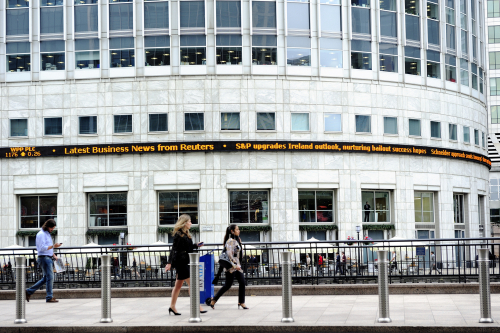

The following is a transcript of my conversation with Reuters this afternoon. We discuss everything from US CPI to the Fed response to my key thoughts for the year ahead. Enjoy!
This article is only available to Macro Hive subscribers. Sign-up to receive world-class macro analysis with a daily curated newsletter, podcast, original content from award-winning researchers, cross market strategy, equity insights, trade ideas, crypto flow frameworks, academic paper summaries, explanation and analysis of market-moving events, community investor chat room, and more.
The following is a transcript of my conversation with Reuters this afternoon. We discuss everything from US CPI to the Fed response to my key thoughts for the year ahead. Enjoy!
Lisa Mattackal, Reuters International:
Time for our next chat… GMF, please welcome Bilal Hafeez, CEO, MacroHive
GMF:
Hi Bilal, welcome back to the forum!
Bilal Hafeez:
Thanks- excited to be back.
Lisa Mattackal:
Bilal, what are your expectations for US inflation data coming out shortly, and how much weight do you think it’ll have on Fed deliberations at the next meeting given official commentary over the last few weeks would indicate they’re not nearly ready to pause hikes?
Bilal Hafeez:
The main focus for the market is the core CPI m/m. Consensus is +0.3% and I think it will come in line, but the risk is it comes lower at 0.2% (similar to what we saw in Dec). The price paid components of recent PMI data were quite weak. For the Fed, a low number will lead them to a 25bps hike. At the moment, the market is unsure between a 25 and a 50bps hike. So we are in for a few more hikes.
Lisa Mattackal:
Got that. What impact do you see on other central bank trajectories? Or do you think regional factors are driving the ECB/BoE now more so than ripple effects of Fed policy?
Bilal Hafeez:
I think other regions have their own dynamics. Notably, the Euro-area recently saw core CPI pick up, which should keep ECB hawkish. In some ways other regions are six months behind the the US/Fed. The BoE is more tricky as the bank is more dovish and is looking for weak growth to pull inflation lower. Again, more regional effects than the US affecting them
Lisa Mattackal:
How do you see the BoE walking that inflation/growth line? GMF, we’re speaking with Bilal Hafeez, CEO, MacroHive. Feel free to post your questions, or let me know if you have any.
Bilal Hafeez:
Well, I think the BoE will be much larger weight on weaker growth dynamics. Housing/mortgages will be a big issue for the UK this year. So the BoE may do a few more hikes, but they will be keen to end their hiking cycle and hope that the recession will pull inflation lower
Lisa Mattackal:
One question from a forum member Bilal: Do you anticipate much impact on UK growth from the labour strikes?
Bilal Hafeez:
Good question – there will likely be only a moderate impact. There will be some lost workdays from the striking workers, but so far it looks like other workers/sectors were not affected as much. It helps that many can also work from home now. Ironically, something like the extra bank holidays from the Queen’s death last year and the upcoming one for the King’s coronation could have a bigger negative economic impact. But the strikes do show that the UK could be in a 1970s style wage-inflation spiral which could be a problem for growth longer term.
Lisa Mattackal:
Interesting! Could some of the proposed legislation about strikes mitigate that?
Bilal Hafeez:
Yes, it could. In the short-term banning strikes should reduce the number of lost workdays. But looking at the 1970s, measures to aggressively restrict strikes could backfire and you could get ‘illegal’ strikes. We’ll see how that unfolds.
Lisa Mattackal:
The consensus take at the moment seems to be that it’s going to be a good year for bonds, not so much for equities – do you agree? What could catalyse an equity market recovery?
Bilal Hafeez:
Yes, I think the counter-consensus view of an equity recovery would be driven by the end of the Fed hiking cycle. So far this year, we have already started to see some of that. After last week’s weak services PMI – bond yields fell, but stocks rallied. On top of that, if the labour markets stay relatively strong then we could have goldilocks scenario of the Fed ending its hiking cycle and growth not falling into recession. That could help equities. The re-openining of China also helps. The biggest non-consensus view, though, is the re-emergence of inflation. That could see a repeat of 2022 – both bonds and equities selling off.
Lisa Mattackal:
Do you think that risk is being underpriced?
Bilal Hafeez:
Yes, I do. I think there is a good chance that inflation will be stickier than people think. It may only become clear on Q2/Q3, but the risk is there. What concerns me is that the US labour market still seems imbalanced where service sector wages could stay strong. On top of that, the re-opening of China could see commodity prices pick up once again.
Lisa Mattackal:
Finally, wanted to get your thoughts on what could be next for the BoJ – do you think they’ll widen the 10-year bond yield band again?
Bilal Hafeez:
Yes, I do. When they widened the YCC band in December they cited bond market problems as the reason. Our metrics suggest that the JGB market is still broken, so they need to take steps to widen YCC or even remove and so normalise that market. We have a BoJ meeting next week so that could important. They may announce something or at least give hints on their thinking
Lisa Mattackal:
What a huge shift if YCC is removed!
Bilal Hafeez:
Yes indeed. They would likely continue to widen by 25 or 50bps steps, but the end-game is to remove it
Lisa Mattackal:
Wonder if they’d hike rates before resorting to that. Bilal, any final thoughts for us?
Bilal Hafeez:
Thanks. Main thoughts are that what we see at the start of the year doesn’t often tell us much about the rest of the year. Don’t write off inflation just yet and I still that the interest rate hikes we have already seen could still impact risk markets negatively! 2023 should be fascinating year.
Lisa Mattackal:
Indeed!
